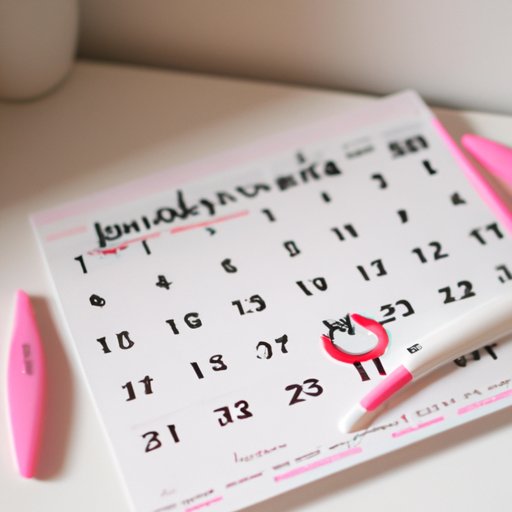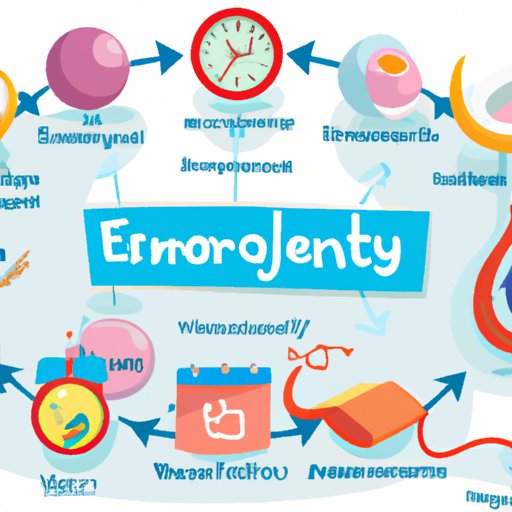Introduction
When it comes to understanding your fertility, it’s important to know when you are most likely to conceive. Many people ask, “Am I fertile right after my period?” The answer to this question is not a simple yes or no. It depends on several factors, including the length of your menstrual cycle, hormone levels, and other lifestyle factors. In this article, we will explore these topics in more detail so that you can better understand your fertility window after a period.
Exploring the Connection Between Menstrual Cycles and Fertility
A menstrual cycle is the time between the first day of one period and the first day of the next period. On average, a woman’s menstrual cycle lasts 28 days, but this can vary from person to person. During the menstrual cycle, hormones fluctuate which can affect fertility. Understanding these hormones, as well as other factors, can help you determine if you are fertile right after your period.
Definition of Menstrual Cycle
The menstrual cycle is the process that occurs in the female reproductive system to prepare for potential pregnancy. During the menstrual cycle, the uterus prepares itself by building up a thick lining of blood vessels, muscle, and tissue called the endometrium. This lining will be shed during menstruation if an egg is not fertilized.
Factors That Influence Fertility During the Menstrual Cycle
There are several factors that can influence fertility during the menstrual cycle, including age, health, lifestyle habits, and hormone levels. Age is important because fertility begins to decline in the late 20s and early 30s. Health can also have an impact on fertility. Lifestyle habits like smoking, drinking alcohol, and not getting enough sleep can all reduce fertility. Finally, hormone levels play a key role in fertility.
Role of Hormones in Menstrual Cycles and Fertility
Hormones play a critical role in the menstrual cycle and fertility. Estrogen and progesterone are two hormones that rise and fall throughout the cycle and can affect fertility. Estrogen levels rise at the beginning of the cycle, stimulating the growth of the endometrium. Progesterone levels rise in the second half of the cycle and prepare the uterus for implantation of a fertilized egg. If the egg is not fertilized, then progesterone levels will drop and the endometrium will shed during menstruation.

Understanding Your Fertility Window After a Period
It’s important to understand your fertility window after a period in order to maximize your chances of conception. Here are some things to consider:
How Long Does Fertility Last After Your Period?
The length of time that you are fertile after your period depends on the length of your menstrual cycle. Generally, you are most fertile about 14 days before your next period begins. However, if your cycle is shorter than 28 days, you may be able to get pregnant sooner. For example, if you have a 24-day cycle, then you may be fertile as soon as 10 days after your period.
What Does the Fertile Window Look Like?
Your fertile window begins a few days before ovulation and ends a few days after. Ovulation typically occurs about 14 days before your next period starts. During this time, your body releases an egg that can be fertilized. The exact timing of ovulation can vary from cycle to cycle, so it’s important to track your cycles to determine when you are most likely to conceive.
When Is the Best Time to Conceive?
The best time to conceive is during your fertile window, which is usually a few days before and after ovulation. Having regular sexual intercourse during this time can increase your chances of conception. It’s also important to remember that sperm can live inside the female body for up to five days, so having sex a few days before ovulation can still result in pregnancy.
What to Expect From Post-Period Fertility
Knowing what to expect from post-period fertility can help you better understand your fertility window. Here are some changes that you may experience when you are most fertile after a period:
Changes in Body Temperature
An increase in body temperature is one of the signs that ovulation is occurring. This is because progesterone levels begin to rise just before ovulation. Monitoring your basal body temperature (BBT) can help you determine when you are most fertile. To do this, take your temperature with a basal thermometer each morning before you get out of bed.
Cervical Mucus Changes
Another sign of ovulation is a change in cervical mucus. During the most fertile days of your cycle, your cervical mucus will become thin, clear, and slippery. This helps the sperm travel towards the egg. If you are trying to conceive, checking your cervical mucus can help you determine when you are most fertile.
Ovulation Predictor Kits
Ovulation predictor kits (OPKs) are another way to track your fertility. These tests detect the surge in luteinizing hormone (LH) that occurs just before ovulation. LH is a hormone that triggers the release of an egg from the ovary. By tracking your LH levels, you can determine when you are most likely to conceive.
The Science Behind Post-Period Fertility
It’s important to understand the science behind post-period fertility in order to maximize your chances of conception. Here are some key points to keep in mind:
Role of Fertility Hormones
Fertility hormones play a key role in post-period fertility. Estrogen and progesterone levels rise and fall throughout the menstrual cycle and can affect fertility. Estrogen stimulates the growth of the endometrium and progesterone prepares the uterus for implantation of a fertilized egg. Tracking your hormone levels can help you determine when you are most fertile.
Importance of Timing Intercourse
Timing intercourse correctly is key to increasing your chances of conception. Having regular sexual intercourse during your fertile window is the best way to maximize your chances of conceiving. Remember that sperm can live inside the female body for up to five days, so having sex a few days before ovulation can still result in pregnancy.
Understanding Your Personal Cycle
Finally, it’s important to understand your personal cycle in order to determine when you are most fertile. Factors like age, health, lifestyle habits, and hormone levels can all affect your fertility. Tracking your menstrual cycle and monitoring your body for signs of ovulation can help you determine when you are most likely to conceive.

Maximizing Your Chances of Conception After Your Period
Once you understand your post-period fertility, there are steps you can take to maximize your chances of conception. Here are some tips:
Healthy Lifestyle Habits
Adopting healthy lifestyle habits can improve your fertility. Eating a balanced diet, exercising regularly, and getting enough sleep can all help to optimize your fertility. Additionally, avoiding drugs, alcohol, and cigarettes can help increase your chances of conception.
Regular Sexual Intercourse
Having regular sexual intercourse during your fertile window is the best way to maximize your chances of conceiving. Remember that sperm can live inside the female body for up to five days, so having sex a few days before ovulation can still result in pregnancy.
Track Ovulation With an OPK
Using an ovulation predictor kit (OPK) can help you pinpoint your fertile window. These tests detect the surge in luteinizing hormone (LH) that occurs just before ovulation. By tracking your LH levels, you can determine when you are most likely to conceive.
Consider Medical Treatments If Necessary
If you are having difficulty conceiving, you may want to consider medical treatments. These can include fertility medications, intrauterine insemination (IUI), or in vitro fertilization (IVF). Talk to your doctor to find out what options are available to you.
Conclusion
In conclusion, understanding your fertility window after a period is key to maximizing your chances of conception. Knowing when you are most fertile can help you better plan for pregnancy. Factors like age, health, lifestyle habits, and hormone levels can all affect your fertility. Additionally, tracking your menstrual cycle, monitoring your body for signs of ovulation, and using an ovulation predictor kit can all help you determine when you are most likely to conceive. Finally, adopting healthy lifestyle habits and having regular sexual intercourse during your fertile window can help increase your chances of conception. If you are having difficulty conceiving, talk to your doctor about medical treatments that may be available to you.
(Note: Is this article not meeting your expectations? Do you have knowledge or insights to share? Unlock new opportunities and expand your reach by joining our authors team. Click Registration to join us and share your expertise with our readers.)
